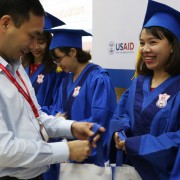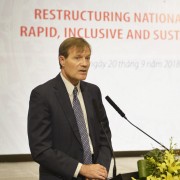Speeches Shim
Through the USAID Governance for Inclusive Growth Program and the USAID Trade Facilitation Program, USAID is supporting the General Department of Vietnam Customs and relevant ministries to effectively implement trade facilitation laws and regulations, and to simplify specialized inspection procedures for imports and exports. This support has contributed to the Prime Minister recently approving an action plan to expedite the implementation of the National Single Window and ASEAN Single Window, a one-stop shop for customs procedures, and to reform specialized inspection of imports and exports. The plan sets out goals and solutions with timelines to be implemented by ministries and agencies. It also specifies the administrative procedures under the National Single Window, lists legal and regulatory documents for specialized inspections that need revision, and lists the imports and exports subject to specialized inspections.
Beehive stoves, which are popular in Vietnam, rely on coal and produce significant amounts of carbon monoxide, which can be toxic to human and animal health. It is estimated that Hanoi alone consumes approximately 528 tons of coal and produces 1,870 tons of carbon dioxide per day. On September 29, USAID’s Clean Air Green Cities project partnered with local authorities, Coca-Cola, and Namilux, a leading Vietnamese gas stove producer, to organize “Stove Swap Day” - an event to raise public awareness of the negative health impacts of air pollution from beehive stoves. During the event in Hanoi’s Hoan Kiem locality, 94 gas stoves were donated to residents in exchange for their current beehive stoves. In addition, free screenings were conducted for 84 individuals, focusing on cardiovascular, ear, nose, throat, and respiratory health.
USAID’s Governance for Inclusive Growth program has been supporting the Ministry of Planning and Investment to develop an e-marketplace portal that will provide information on goods and services (such as office supplies) commonly procured by the Government of Vietnam, and facilitate online ordering from selected suppliers. Efforts to support Vietnam’s e-procurement plan for the period of 2016 – 2025 are being led by the Public Procurement Agency (PPA) within the Ministry of Planning and Investment (MPI). This week, USAID supported PPA with a workshop in Ho Chi Minh City to finish developing this pilot e-marketplace portal and finalize procedures for centralized procurement by state enterprises, including discussing how a legal framework should be drafted to help implement the e-marketplace.

“One Health” provides a coordinated approach to counter emerging infectious disease threats at the interface of animal, human, and ecosystem health. This intersectoral approach requires individuals to work collaboratively at different levels of the health system, to effectively prevent and control emerging or known pandemic diseases. On September 28, Ritu Singh, USAID/Vietnam’s Office of Health Director, attended the graduation ceremony for the 2017 Masters of Public Health class at Hanoi Medical University. The ceremony also welcomed 25 students from the 2018 class. The origin of this program comes from 2016, when USAID supported Hanoi Medical University to launch a one-year Masters of Public Health degree with a One Health orientation in collaboration with the Vietnam One Health University Network (VOHUN), Tufts University, and University of Minnesota. So far, there are 37 Masters of Public Health graduates, consisting of Vietnamese and international students.

On September 20, USAID’s Governance for Inclusive Growth (GIG) program joined the Ministry of Finance (MOF) and the European Union to organize the Vietnam Finance Forum 2018 with the theme, “Restructuring National Finances towards Rapid, Inclusive and Sustainable Development.” This second annual forum was attended by about 300 people and brought together domestic and international experts to review a range of budget and policy issues.

Comment
Make a general inquiry or suggest an improvement.